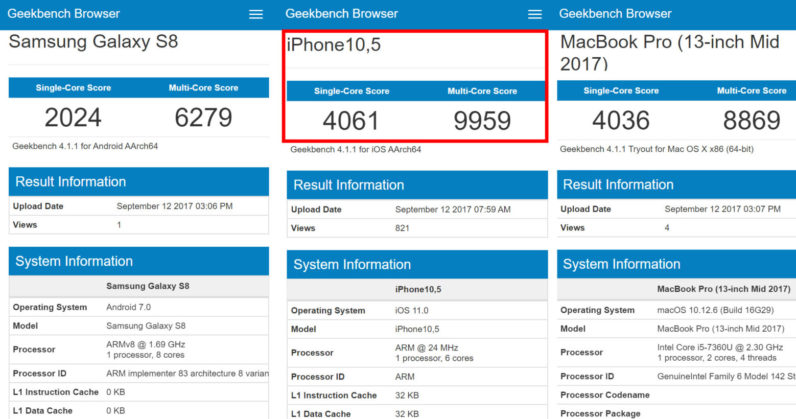According to The Next Web, a device bearing the monikor “iPhone10,5” showed up on the Geekbench catalog a day before the big launch. And its results are astonishingly.
It completely runs circles around anything from the current Android camp. Yes, this includes the latest Samsung Galaxy S8, OnePlus 5 and Huawei P10.

The iPhone X scores 4,095 on single core tests and tops 9,959 on the multi-core ones. That’s double the speed of anything Android has to offer on both tests.
To compare:
- Samsung Galaxy S8: 2,204 single, 6,279 multi
- OnePlus 5: 1,932 single, 6,495 multi
- Huawei P10: 1,865 single, 5,973 multi
This isn’t the first time Apple’s A-series SoCs have scorched the benchmarks. The iPhone 6s and iPhone 7 have also topped the charts in their generation. And convincingly too.
The core of the iPhone X’s industry-leading performance is the new Apple-designed A11 Bionic chip. The chip is a 6-core unit with two high performance cores and four high efficiency cores. Apple says the new chip is 20% faster than the A10 Fusion in high performance tasks, and 70% faster in high-efficiency tasks.
Additionally, it has a new Apple-designed multi-core GPU that’s 30% faster than the A10 Fusion, while using half the power.
More powerful than a MacBook Pro?
What’s shocking is that the iPhone X’s performance surpasses even the iPad Pro 10.5-inch, MacBook Air (2017) and MacBook Pro 13-inch (2017) Core i5! Results as below:
- iPad Pro 10.5-inch: 3,558 single, 9,133 multi
- MacBook Air (2017): 3,216 single, 5,935 multi
- MacBook Pro 13-inch (2017): 4,342 single, 9,194 multi
Benchmarks aren’t everything of course, but it’s interesting to know just how powerful Apple’s new mobile chip is. Having said that, it’s amazing how powerful a smartphone can be these days, eh?










